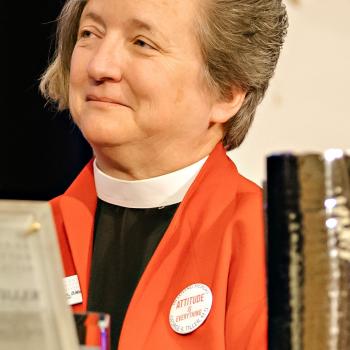 Guest blogger Fr Harvey Nicolaitan SJ, is a master of modern media. With a degree in Communications, he is a well known author and guest on reality TV shows, Fr Nicolaitan has been invited to speak at many of our nation’s greatest Catholic intellectual powerhouses. A member of the Vatican Confectory for International Dissimulation, he advises bishops on effective communication. Fr Nicolaitan is contributing a series on “Rules for Radicals or How To Be A Successful Catholic Dissident Today”.
Guest blogger Fr Harvey Nicolaitan SJ, is a master of modern media. With a degree in Communications, he is a well known author and guest on reality TV shows, Fr Nicolaitan has been invited to speak at many of our nation’s greatest Catholic intellectual powerhouses. A member of the Vatican Confectory for International Dissimulation, he advises bishops on effective communication. Fr Nicolaitan is contributing a series on “Rules for Radicals or How To Be A Successful Catholic Dissident Today”.
I am very flattered to contribute to this blog, and will be sharing with you some of the secrets of successful communication in the Catholic Church. Unlike other political institutions, the Catholic Church has a very strict set of doctrines, beliefs and moral teachings. This makes dissent within the Catholic Church a very tricky business indeed, but it can be done if you follow my simple rules and stick to them.
In the past dissidents in the Catholic Church made the mistake of being open in their dissent. The rigid, dogma bound members of the hierarchy flexed their inquisitorial muscles and silenced people. Invariably the dissident either conformed or drifted off and formed an ineffectual sect of protest. We need to learn from these lessons of the past and realize that the most effective form of dissent is not to dissent at all. Never do anything that will make the Vatican thought police sniff you out and hunt you down.
Therefore the first and most important rule is “Know the Catholic faith and stick to it.” To be able to dissent effectively you need to know what you are dissenting from. Therefore you need to know Catholic doctrine and moral teaching inside and out. This accomplishes several objectives. First of all, you know the territory, and secondly you can always say publicly, “I understand and fully affirm everything the Catholic Church teaches.”
I know what you are thinking: “How is that dissent?” Its a good question. It works like this. You see, our theologians and Bible scholars have taught us that what is most important is not the particular words, but the interpretation of those words. So you may say, for example, that you believe in the resurrection of Jesus Christ from the dead. This is good and orthodox. Of course, what you mean is, “In some mysterious way the disciples of Jesus continued to believe his beautiful teachings even after his tragic death.”
In the area of moral teaching you can affirm fully that sacramental marriage is between one man and one woman for life. What you really mean is that you believe this is a beautiful ideal, but in real life you acknowledge that contemporary anthropological and cultural changes require a diversified and analytical approach which cannot be limited to pastoral and missionary practices of the past.
Of course you believe that marriage is between one man and one woman for life, but you acknowledge that this is actually impossible in the real world and there are many forms of love and marriage–all of which are good in their own way. You might think this is being dishonest, but we Jesuits have long admired the principle of equivocation–in which truth is spoken in a way that allows for various interpretations.
So this is the first and most important lesson in being a Catholic dissident today: know the Catholic faith and stick to it.
If people object to your position you can say in all truthfulness, “But I am a priest in good standing!” You can honestly say, “I affirm everything the church teaches!” If you are a religious you can say, “My superior approves of me!” You can challenge your critics to show where in any statement you have ever departed from the church’s teachings. They will fail because you never depart from church teachings.
While this might seem unduly bound to doctrine and seem like a rigid approach, with a bit of thought you can see that it actually frees you to hold whatever interpretations of Catholic teaching you think appropriate. You use something called “mental reservation”. when your real opinions are likely to confuse or offend someone. This means you hold back what you really believe and use an outward form of expression that is acceptable.
So, for example, you may be confronted with a straight question like, “Father, do you approve of sexual relations outside of marriage” You may agree with Bishop McElroy that chastity is not really the most important of virtues, and you would first want to meet the person and accompany them and listen to their story and come to understand their desire for real love. Instead of getting into all that and confusing people, you can just say, “The church’s teaching on that subject is clear. Sexual relations outside of marriage are not condoned.”
Of course you realize the real situation is far more complicated, but by stating the church teaching your hearer is satisfied that you hold to an orthodox position. You can then move on to more important matters.
I hope you will stay with me in these little lessons in effective communications. In the days ahead we will discuss how to cultivate a popular image as a priest and what to do when conflict arises.
Image Creative Commons via Bing












